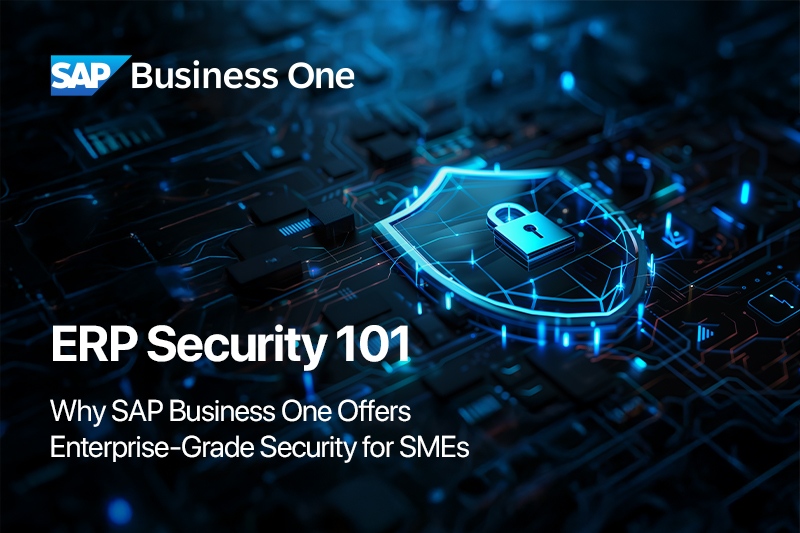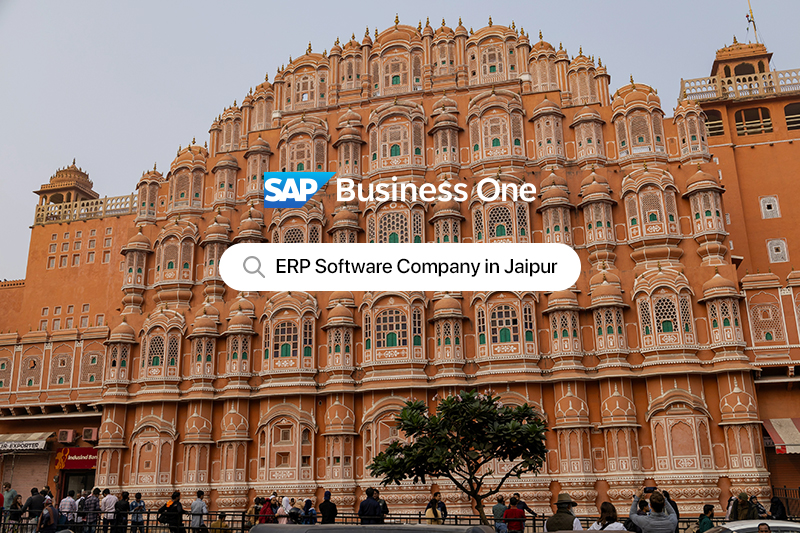In a market where a single breach can stall growth, erode trust, and trigger regulatory penalties, Indian SMEs can’t afford “good-enough” ERP security. From DPDP Act 2023 obligations to GST e-invoicing integrity, the stakes are higher than ever. That’s why an ERP with built-in controls—plus a partner who implements them correctly—matters. Enter SAP Business One. Deployed on-premises or in the cloud, it combines mature security controls with India-ready compliance and a robust ecosystem. And with Ingold Solutions—a seasoned SAP Business One partner in India and SAP agency in Kolkata—you get security by design, not by accident.
The Indian security context: why SMEs need enterprise-grade protection
- Regulation is rising: India’s Digital Personal Data Protection (DPDP) Act, 2023 elevates data-processing duties for enterprises handling personal data (customers, employees, vendors). Sectoral norms (RBI/SEBI/IRDAI), MeitY advisories, and CERT-In incident reporting add further expectations for governance and response.
- Digital tax rails: GST e-invoicing and e-waybill flows rely on tamper-proof, API-driven exchanges with IRP/NIC systems. Integrity and non-repudiation matter.
- Supply-chain exposure: MSME distributors and manufacturers increasingly integrate with marketplaces, 3PLs, and payment gateways—expanding the attack surface.
Bottom line: Indian SMEs need ERP security that spans identity, data, application, network, monitoring, and compliance—without creating admin overhead. SAP Business One delivers exactly that.
SAP Business One security—what’s inside (that competitors often gloss over)
1) Identity & access management (who gets in, and what they can do)
- Granular authorizations: Define per-user or role-based rights at module/object level (e.g., Sales Orders “Read-Only,” Purchase Orders “Full,” Banking “No Access”).
- Data Ownership rules: Limit visibility to “owned” business partners or documents—effective “row-level” scoping for sales teams and franchises.
- Approval Procedures: Multi-step approvals (amount thresholds, vendor changes, discounts) reduce fraud and enforce maker-checker.
- SSO & MFA (via platform): When hosted on Azure/AWS, integrate with Azure AD/Entra ID or other identity providers for SSO and enforce MFA policies.
Why it matters in India: Segregation of duties (SoD) is a common audit finding for SMEs. Business One’s authorizations + approvals make SoD practical without buying a heavyweight GRC suite.
Data security (how information stays confidential and tamper-resistant)
- Encryption in transit: The Service Layer and web clients use HTTPS (TLS) to protect API calls and browser sessions.
- Encryption at rest (platform):
- SAP HANA supports native data-at-rest encryption.
- Microsoft SQL Server supports TDE for database-level encryption.
- Cloud disks (Azure/AWS) can be encrypted transparently.
- Change Log & Audit: Out-of-the-box logs for add/update/remove actions on master data and transactions; essential for forensic analysis and statutory audits.
- Document numbering & referential integrity: Prevents duplicate/ghost records; critical for GST and statutory reporting consistency.
India angle: Secure, immutable histories simplify GST audits, vendor reconciliations, and e-invoicing traceability.
Application-layer controls (reduce fraud and configuration drift)
- Field validations & user-defined objects (UDOs): Enforce business rules (e.g., GSTIN format, PAN length) and avoid “dirty data.”
- Document drafts & versioning: Stage sensitive transactions for review before posting.
- Electronic integrations: Digitally sign PDFs via add-ons; integrate to IRP for e-invoice IRN/QR code through secure connectors.
- Localization packs: India localization for GST, TDS/TCS, e-waybill, and statutory formats reduces risky custom code.
Competitor gap: Many SMB ERPs (or un-hardened open-source deployments) rely on partner scripts for “security”—uneven quality and audit exposure.
Network & infrastructure hardening (especially for cloud)
With SAP Business One Cloud on Azure/AWS:
- Private networks & firewalls: VNet/VPC isolation, NSGs/Security Groups, and WAF for published endpoints.
- Bastion & Just-In-Time access: Admin access without exposing RDP/SSH to the internet; temporary elevation for maintenance.
- Backup & DR: Automated snapshots; cross-region replication; tested RTO/RPO aligned to business risk.
- Monitoring: Platform logs (Azure Monitor/CloudWatch) + OS/DB metrics + SAP application logs feed alerts.
Reality check: Public-cloud shared-responsibility still requires correct configuration. This is where your partner matters.
5) Observability & incident response (because prevention isn’t perfect)
- End-to-end logging: Application change logs + DB auditing + OS events + cloud provider telemetry.
- Alerting: Thresholds for failed logins, abnormal API calls, or sudden data exports.
- Playbooks: Isolation steps, restore procedures, and CERT-In-aligned incident reporting.
- Periodic DR drills: Validate backups and failover to meet customer and regulatory expectations.
Don’t overlook: Many competitors talk encryption; few operationalize detection + response for SMEs.
SAP Business One vs common alternatives (security perspective)
No vendor bashing—just practical differences SMEs should evaluate.
- NetSuite (public cloud only): Strong SaaS controls and uptime, but data residency/control over update windows can be limiting for some Indian firms; India compliance often via third-party connectors.
- Dynamics 365 Business Central: Tight Azure AD security and Microsoft stack synergy; however, Indian localization may rely on extensions that vary by partner quality.
- Odoo/Open-source stacks: Highly flexible, but security posture depends on implementer hardening (patch cadence, role design, VPC design).
- Tally/entry-level tools: Excellent for accounting basics; limited enterprise IAM, workflow approvals, or auditability at scale.
SAP Business One advantage: Balanced control (public/private cloud), mature authorizations, India localization, and a deep partner ecosystem to implement security correctly.
A security blueprint for Indian SMEs on SAP Business One
1) Identity & SoD
- Map roles to responsibilities; avoid “god” accounts.
- Enforce MFA via Azure AD/IdP; enable conditional access (geo/IP/device checks).
2) Data controls
- Turn on DB encryption (HANA/SQL TDE).
- Restrict DB access to app tier and admins (no direct DB browsing for users).
- Use Data Ownership for sales/service teams.
3) App hygiene
- Lock down “dangerous” menu items; default to Read-Only where possible.
- Mandate Approval Procedures for vendor master changes, bank details, credit limits, and unusually large invoices.
4) Network posture
- Place Service Layer behind reverse proxy/WAF; disable open RDP/SSH.
- Use Private Endpoints/Peering for integrations (e-invoice, DMS, BI).
5) Monitoring & DR
- Centralize logs (SIEM-ready).
- Quarterly restore tests; annual DR drills; document RTO/RPO.
6) Compliance
- Align privacy notices and consents with DPDP Act.
- Maintain audit artefacts for GST and TDS/TCS; review SoD annually.
Why the partner matters: security by design with Ingold Solutions
Choosing the right software is half the battle; secure implementation and steady operations are the other half. As a proven SAP Business One partner in India and SAP agency in Kolkata, Ingold Solutions delivers:
- Security-first deployments
- Azure/AWS landing zone with VNet/VPC isolation, WAF, Bastion, disk encryption.
- HANA/SQL hardening, least-privilege service accounts, key vaults for secrets.
- Prebuilt role templates for Indian SMEs (Finance, Purchase, Stores, Sales, Service).
- Data Ownership models for region/branch-wise visibility.
- Compliance & localization
- India packs for GST, e-invoice, e-waybill, TDS/TCS; secure IRP integration.
- DPDP-aligned data-handling SOPs; audit-ready change logs.
- Managed services & monitoring
- 24×7 monitoring, patch cadence, CIS-inspired baselines, VAPT coordination.
- Backup strategy (3-2-1), cross-region DR, documented playbooks, periodic drills.
- Secure connectors to marketplaces, 3PLs, payment gateways, Power BI/SAC—with rate-limits, API keys rotation, IP allowlists.
Outcome: You get enterprise-grade security without enterprise overhead.
Real-world snapshot: a Kolkata manufacturer closes audit gaps
Context: A mid-size discrete manufacturer near Kolkata was expanding exports and onboarding new channel partners. Internal audit flagged SoD conflicts, risky admin access, and untested backups.
What we did (Ingold Solutions):
- Migrated SAP B1 to Azure; implemented MFA/SSO via Azure AD.
- Re-engineered roles with maker-checker approvals on vendor bank edits and credit releases.
- Enabled DB encryption, centralized logs, and built alerts for failed logins & out-of-hours exports.
- Set RPO 15 min / RTO 2 hrs; ran DR drill with documented sign-offs.
- Secured e-invoice integration with IRP using scoped API keys and IP allowlists.
Results (six months):
- Zero audit non-conformities on ERP access.
- 70% fewer emergency admin accesses.
- Successful DR test within SLA; insurer accepted evidence for premium benefits.
- Faster vendor onboarding without sacrificing controls.
FAQs
Q1. We’re a 30-user SME. Isn’t this overkill?
Not when you consider DPDP, GST e-invoicing, vendor fraud risks, and supply-chain integrations. SAP B1 provides right-sized controls that scale with you.
Q2. Cloud or on-prem—what’s safer for us?
Both can be safe if implemented correctly. Cloud (Azure/AWS) adds built-in encryption, DR, and IAM—but still needs hardening. We guide you either way.
Q3. Can SAP Business One help with SoD and audit trails?
Yes. Authorizations, Data Ownership, Approval Procedures, and Change Logs provide SoD and traceability auditors expect.
Q4. How do we meet DPDP Act requirements with SAP B1?
We map personal-data fields, tighten access, enable logging, retain consent evidence where applicable, and define retention/erasure SOPs outside the ERP where needed.
Q5. We already run B1 on SQL Server. Do we need HANA for security?
No. Security is strong on both stacks. HANA adds speed/analytics; SQL Server with TDE and OS hardening is also enterprise-grade when configured properly.
Q6. What about e-invoice/e-waybill security?
We set up secure API connectivity to IRP/NIC with scoped credentials, IP allowlists, and monitoring—plus fallbacks to handle IRP outages gracefully.
Q7. Can we get SSO and MFA for field teams?
Yes—via Azure AD/Entra or your IdP. We can enforce conditional access (device posture, geo), and app-specific policies.
The competitive edge: security that accelerates growth
Security isn’t just about avoiding breaches—it unblocks growth:
- Faster enterprise and export onboarding (customers demand proof of controls).
- Lower cyber-insurance premiums with tested DR and documented frameworks.
- Smoother statutory and internal audits.
- Confidence to integrate with marketplaces and global partners.
SAP Business One gives Indian SMEs the security fabric big enterprises take for granted—without heavyweight cost or complexity. Ingold Solutions—your SAP Business One partner in India and SAP agency in Kolkata—turns that fabric into a tailored suit: hardened architecture, clean roles, monitored workloads, and audit-ready evidence.
Ready to make security your growth lever?
If you’re evaluating SAP Business One—or want to harden an existing deployment—let’s blueprint a security-by-design roadmap that fits your budget and risk profile.
Ingold Solutions
Your trusted SAP agency in Kolkata and SAP partner for India-first, security-first ERP.
👉 Book a consultation to see how SAP Business One can deliver enterprise-grade security for your SME—without enterprise headaches.











 Applicable for Package
Applicable for Package Optional
Optional